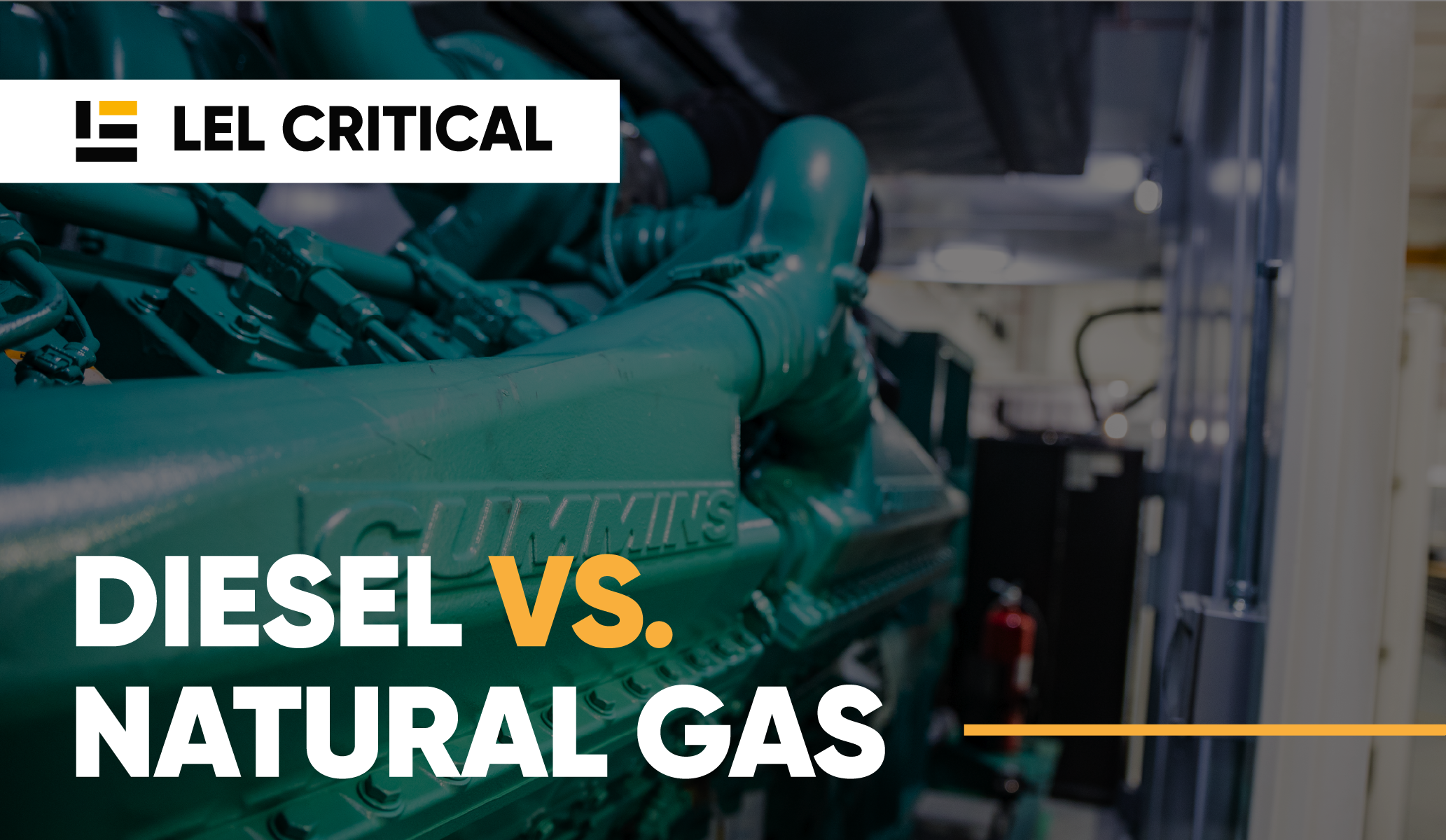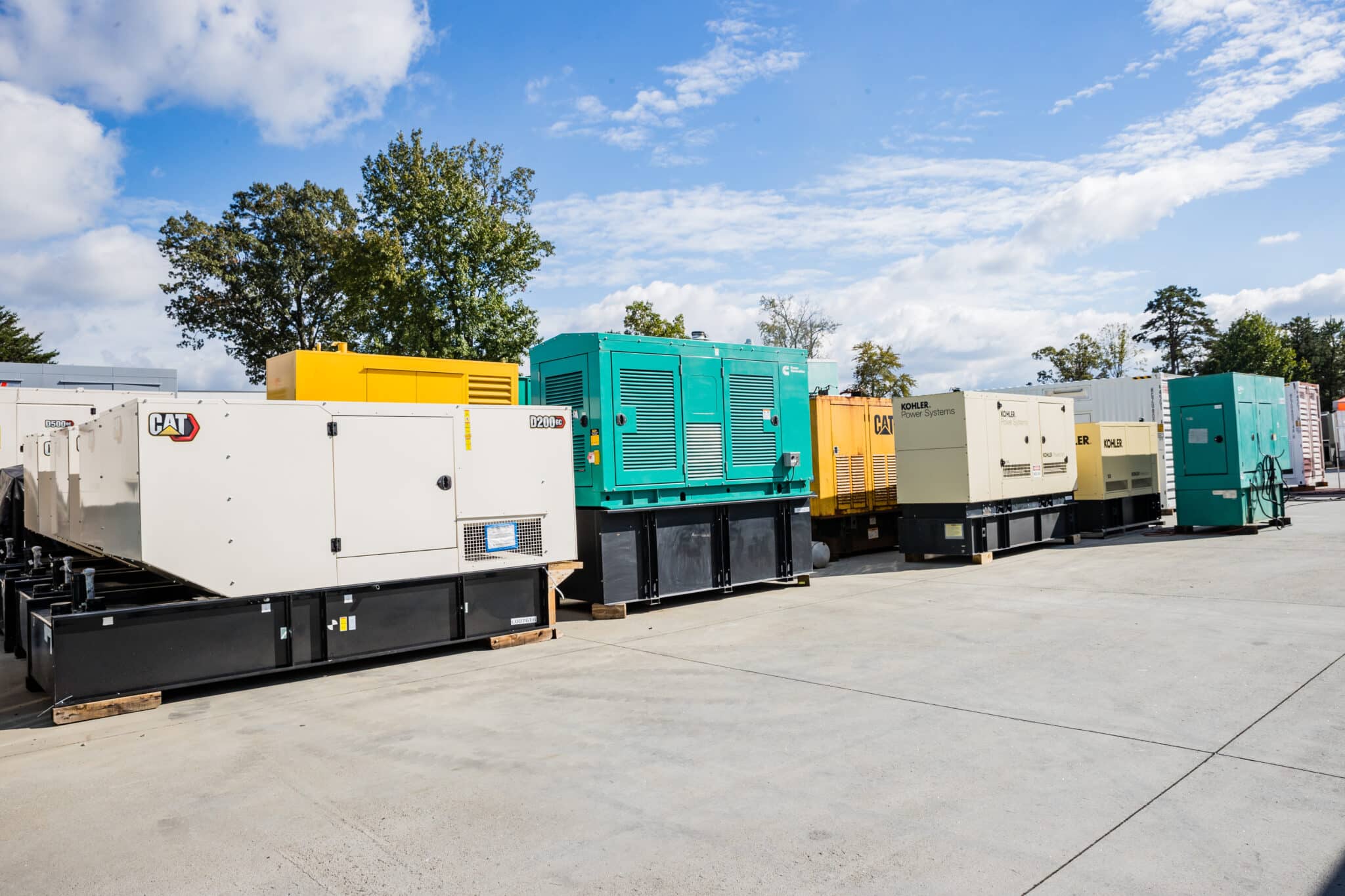
Diesel vs. Natural Gas Generators: Which Is Right for Your Operation?
Choosing the right generator for your facility isn’t just about brand names or engine specs. It comes down to what keeps your operation running efficiently and reliably in the long term. Whether you’re powering a remote job site, outfitting a data center with backup power, or supporting hospital infrastructure, the fuel type behind your generator makes a real impact.
At LEL Critical, we help businesses across industries find power solutions that balance performance, cost, and compliance. In this post, we’ll break down the pros and cons of diesel vs. natural gas generators, compare fuel consumption and costs, and walk through use case considerations to help you make the best choice for your needs.
Diesel Generators
Diesel generators are a long-standing staple in the power generation industry, and for good reason. Known for their durability and strong performance under pressure, diesel units are often the go-to choice for businesses that need reliable power in demanding or remote environments. But like any solution, they come with trade-offs worth considering.
Advantages of Diesel Generators
- Flexible fuel delivery and storage: Diesel can be transported by truck and stored onsite, making it a practical choice for remote facilities or areas without access to pipeline infrastructure.
- Power Surge Resilience: Diesel generators respond quickly to sudden increases in power demand, which makes them a strong fit for operations with heavy equipment or mission-critical systems.
- Fuel-efficient under heavy loads: Diesel engines convert more energy per gallon into usable electricity, which can help reduce fuel costs during high-demand situations
- Built for long-term use: Industrial-grade diesel generators are known for their durability and long lifespan with proper maintenance.
Disadvantages of Diesel Generators
- Higher upfront cost: Diesel generators generally have a higher initial price than natural gas units.
- Stricter emissions profile: Diesel engines produce more regulated pollutants such as nitrogen oxides and particulates, which can trigger permitting challenges in some regions.
- Onsite fuel maintenance required: Diesel fuel degrades over time and must be tested, treated, and stored properly to ensure reliability when needed.
- Louder operation: Compared to natural gas units, diesel generators are typically noisier, which may require sound attenuation solutions in noise-sensitive environments.
Natural Gas Generators
Natural gas generators have become a popular choice for facilities connected to a utility gas line. Known for their cleaner emissions and quieter operation, these units are often used in standby power systems where long run times and environmental compliance matter. While they offer clear advantages in certain settings, they also come with limitations to keep in mind.
Advantages of Natural Gas Generators
- Lower upfront cost: Natural gas generators often cost less to purchase and install, especially in smaller to mid-size power ranges.
- Cleaner emissions: Natural gas burns more cleanly than diesel, producing fewer emissions and making it easier to meet environmental regulations.
- No need to refuel: With a direct connection to the utility pipeline, natural gas generators can run continuously without the need to manage fuel deliveries or storage.
- Quieter and smoother operation: Natural gas engines typically produce less noise and vibration, which makes them a great choice for urban areas, healthcare settings, and hospitality.
Disadvantages of Natural Gas Generators
- Dependent on utility infrastructure: If your facility loses natural gas service due to an emergency or disaster, your generator may be unable to operate when needed most.
- Less efficient at high output: Natural gas engines generally consume more fuel than diesel engines when operating at full capacity, impacting long-term operating costs.
- May require utility upgrades: Depending on the generator size, additional work may be needed to ensure your gas line or meter can support the required fuel flow.
- More frequent ignition maintenance: Spark-ignited engines utilize components such as spark plugs and ignition coils that require regular servicing to maintain optimal performance.
Which Generator Should You Choose?
There’s no one-size-fits-all answer. Diesel generators are reliable workhorses with high power output and excellent fuel efficiency, making them ideal for remote and high-load applications. Natural gas generators are cleaner, quieter, and great for standby systems in populated or regulated environments. The best choice depends on your operational needs, fuel availability, budget, and compliance requirements.
Fuel Consumption & Cost Comparison
Fuel consumption and cost are important factors when choosing between diesel and natural gas generators.
- Diesel generators tend to be more fuel-efficient under load, while natural gas offers cost savings in areas with low utility prices. Your actual fuel costs will depend on load levels, runtime, and local energy rates.
- For a rough estimate of diesel fuel usage at different load levels, explore our Diesel Generator Fuel Consumption Chart. This resource provides helpful planning guidance based on generator size and operational load.
- For natural gas, industry data suggests a 100kW generator may consume over 1,300 cubic feet of gas per hour at full load, depending on the engine and conditions. While natural gas tends to be less expensive per unit, it may require more volume to produce the same amount of power as diesel.
Use Case Considerations: Diesel vs. Natural Gas
Still unsure which option is the better fit? Here are some common scenarios:
| Use Case | Best Fit | Why |
| Remote job sites or off-grid facilities | Diesel | Easy to store and transport fuel, no pipeline needed |
| Urban standby power for healthcare or hospitality | Natural Gas | Quieter, cleaner, and ideal for utility-connected backup |
| Facilities with high power demands | Diesel | Better fuel efficiency and load handling under heavy use |
| Sites with reliable utility infrastructure | Natural Gas | Lower emissions and continuous fuel supply from the pipeline |
| Operations requiring extended backup power | Both | Natural gas for long run times, diesel for emergency fuel flexibility |
Environmental regulations can also influence your choice, especially in areas with air quality restrictions. The EPA’s stationary engine resources provide helpful information on what’s required based on fuel type and generator classification.
Which Generator Should You Choose?
There’s no one-size-fits-all answer. Diesel generators are reliable workhorses with high power output and excellent fuel efficiency, making them ideal for remote and high-load applications. Natural gas generators are cleaner, quieter, and great for standby systems in populated or regulated environments. The best choice depends on your operational needs, fuel availability, budget, and compliance requirements.
Need Help Finding the Right Generator?
At LEL Critical, we specialize in providing high-quality new and used generators and enclosures to meet the unique demands of your business. Whether you know what you need or you’re deciding between diesel vs. natural gas, we’re here to help you find the right solution so you can power your business with confidence.
Explore our current inventory or get in touch to speak with our team of experts.

References
- Worldwide Power Products – Natural Gas Generator Fuel Consumption Chart
- U.S. Energy Information Administration (EIA) – Gasoline and Diesel Fuel Update
- U.S. Energy Information Administration (EIA) – U.S. Natural Gas Prices
- U.S. Environmental Protection Agency (EPA) – Controlling Air Pollution from Stationary Engines
Author
This article was written by Amanda Horner and Alec Graham.






